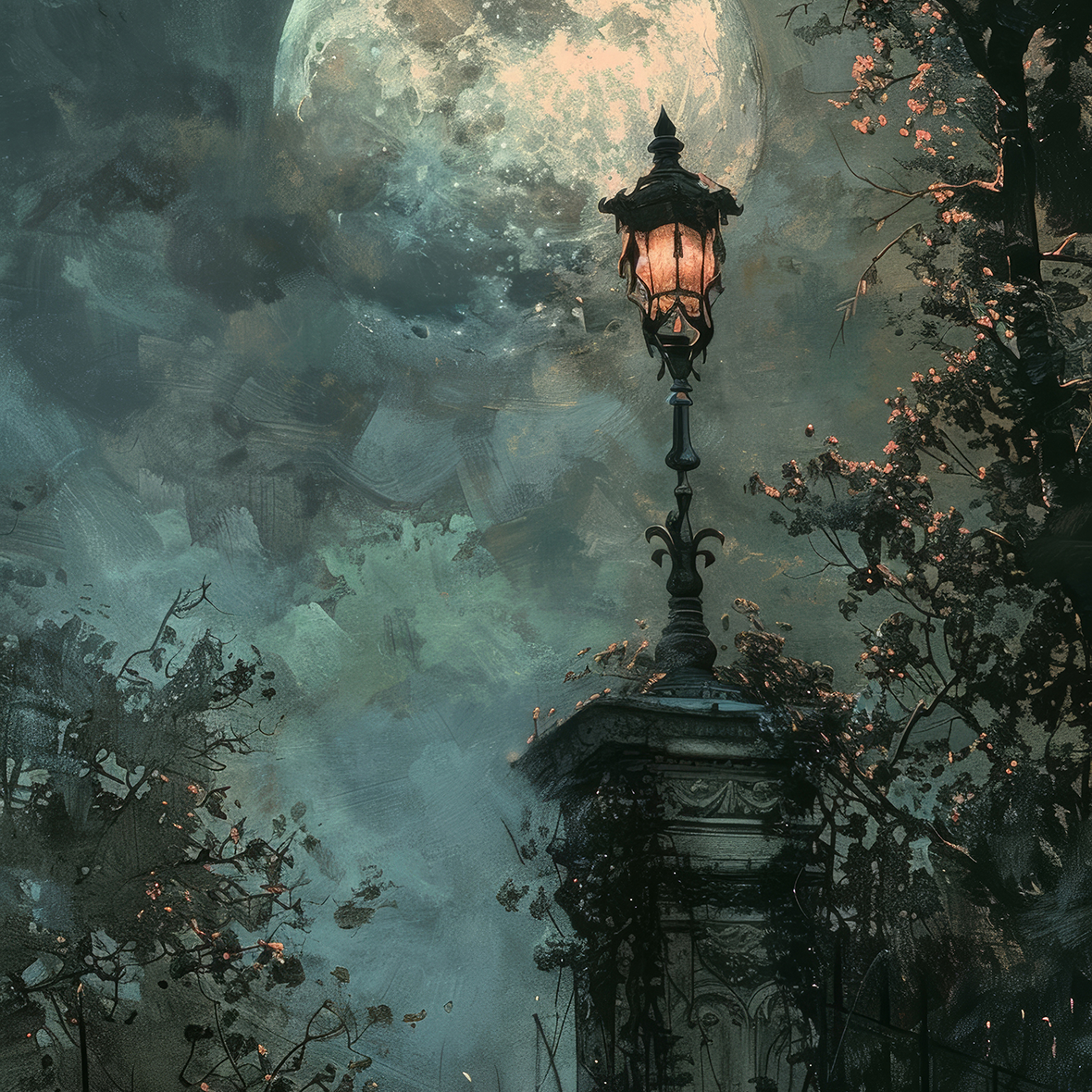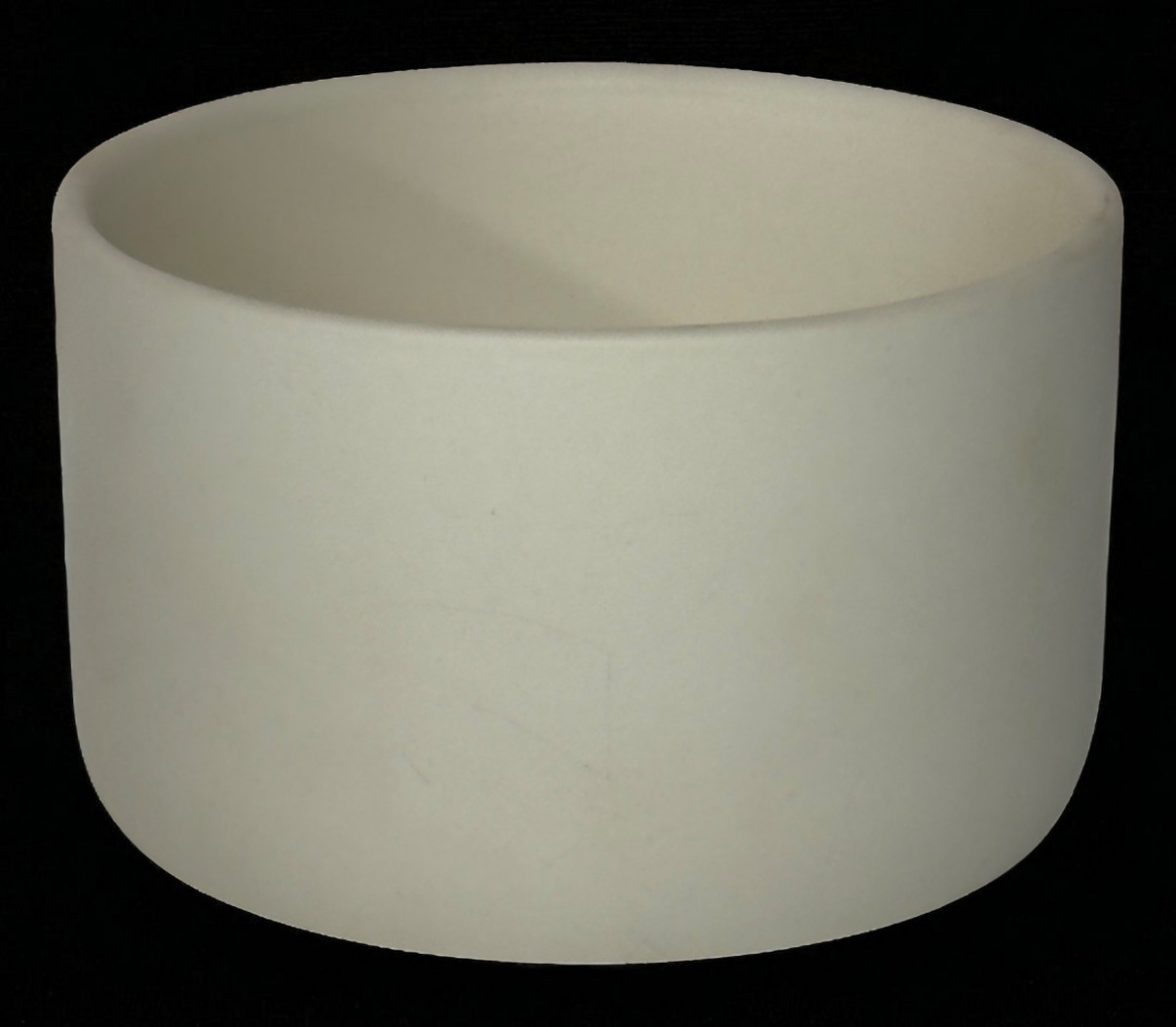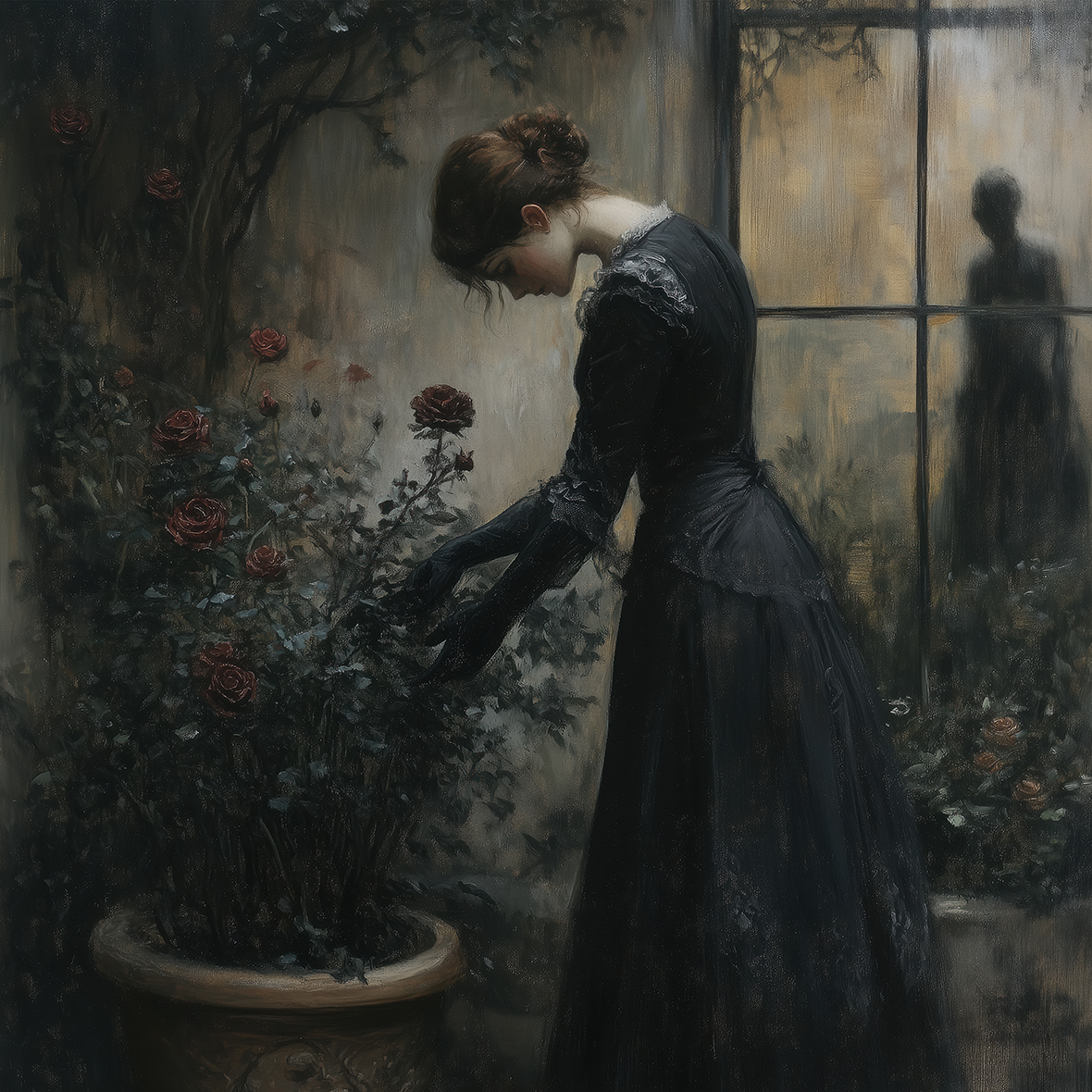Moon over
bourbon street
Where glamour and grief dance cheek to cheek, the mirror never lies. In the gaslit hush of the French Quarter, where every shadow sways to slow jazz and every mirror hides a secret, Celeste Auclair lingers—veiled, watching, waiting. They call her the Moon Bride, the last dancer at the edge of dawn. To meet her gaze is to know what you’ve buried. And to see her in the glass…is never to see yourself the same again.
Scent Profile
Top: Citrus, Bergamot, Powder
Heart: Mushroom, Earth, Moss, Sugar,
Lavender, Vanilla, Ylang Ylang
Base: Sandalwood, Cedar, Musk
Scent Profile
Top: Citrus, Bergamot, Powder
Heart: Mushroom, Earth, Moss, Sugar,
Lavender, Vanilla, Ylang Ylang
Base: Sandalwood, Cedar, Musk

Moon Over Bourbon Street
The moon always knows what the mask conceals.
In the heart of the French Quarter, where wrought-iron balconies cast shadowy scroll work across cobblestones and gaslights flicker like old souls whispering in flame, the night breathes with secrets. There is music, always—slow, low jazz curling through the air like smoke, its melody threaded with memory and desire. But if you listen past the notes, if you stand very still when the moon is high, and the streets go quiet, you may hear something older.
A name. A breath. A heartbeat that doesn't match your own.
This is the legend of Celeste Auclair, the belle of Bourbon Street, the phantom of the midnight waltz.
She was born in 1832 into the opulence of a crumbling Creole dynasty. Her father, a once-prosperous merchant turned recluse, built their three-story home with marble floors and stained-glass windows that burned like fire in the afternoon sun. Her mother died young, as mothers often did in such stories, and Celeste was left to wander the halls alone—listening to the wind whistle through the banisters, tracing the footsteps of dancers long since gone.
Celeste was gifted. Or cursed, depending on who you asked. She could hear things others couldn't. Voices in the walls. Footsteps that echoed in empty rooms. She spoke to shadows and laughed at jokes no one else heard. Some said she was mad. Others said she was touched by the spirits of the city.
She wore black lace at all hours. She kept her face veiled, even in daylight. Her hair was the color of molasses, twisted into elaborate chignons pinned with blood-red garnets. Her voice? Like honey soaked in absinthe—sweet, thick, and just a little dangerous.
When she came of age, she began hosting midnight salons. Not the typical soirées of the Quarter. These were darker. Intimate. Candles guttered low. Mirrors were covered. Cards were read. Glasses moved on their own. It was said that once, she summoned the ghost of a Confederate general who wept at her feet and begged forgiveness.
Guests spoke of strange sensations during her gatherings. The air would turn cold, even in the sweltering heat. Shadows danced against the walls, flickering like they had minds of their own. One woman claimed her dead sister whispered a secret into her ear—and days later, that secret saved her life. A widower reportedly heard his wife's laughter from the corner of the room and left weeping.
But Celeste's most unusual possession was a mirror—oval, antique, framed in tarnished silver—and always draped in black velvet. She called it la fenêtre de l'oubli, the window of forgetting. She claimed that if you stood before it under a full moon, it would show not your reflection but your truest face—the self you tried to hide.
Few dared look. Those who did often left changed.In 1857, during Mardi Gras, a man named Étienne Duvall arrived from Paris. Wealthy, arrogant, and utterly bored, he made quick work of charming half the women in New Orleans. But he found himself fascinated by Celeste—not merely by her beauty, but by her refusal to be conquered.
He courted her, of course. Lavishly. Flowers, jewels, and promises whispered on moonlit balconies. She accepted his attentions but not his affections. She remained aloof as if she saw something in him he wished to keep hidden.
Finally, in a fit of pride and spite, Étienne forced her hand. He challenged her publicly at her own salon. Before a room of guests, he tore the velvet from the mirror and demanded she stand before it with him.
She did.
They gazed into the glass together.
What Étienne saw has never been written. But he screamed.
Some say he clawed at his own face. Others claim he collapsed, whispering in tongues. A few whispered that his reflection split from his body and vanished into the mirror's depths, leaving his shell behind.
Celeste said nothing. She re-veiled the mirror, took Étienne's hand, and led him upstairs.
He was never seen again.
After that night, the salons ceased. The windows of her home stayed dark. The gaslights outside her gate burned low, then went out entirely. She was seen only on moonlit nights—drifting along Bourbon Street in a gown of smoke-gray silk, her veil fluttering like a moth's wing, humming a tune no one recognized.
Then came the fire.
In 1861, a blaze swept through the Marigny Quarter. Several homes were destroyed—Celeste's among them. No body was ever found. Only the mirror remained, lying facedown in the ashes, untouched by heat or flame.
It passed from collector to collector. Lost in a card game and hidden in the back room of a brothel. A traveling illusionist used it in a stage act—until he disappeared mid-performance, leaving only a pair of gloves and the faint scent of crushed violets.
Every so often, the mirror resurfaces. And wherever it goes, strange things follow. Dreams that bleed into waking. Lovers turning to strangers overnight. Music with no source. Whispers from behind locked doors. Always a trail of misremembered truths and cracked reflections.
In 1912, a clairvoyant claimed the mirror responded to her—not in words, but in images. She held a séance, ringed with skeptics. The candles flickered violently, casting faces not present in the room upon the walls. One guest swore they saw their father, long dead, mouthing the words "Don't trust her." The mirror shattered that night—but by morning, it was whole again, veiled in velvet.
In 1939, a jazz pianist went mad after spending an hour alone in the same room as the mirror. He claimed a woman stood behind him, whispering chords he couldn't play, and that his reflection blinked out of rhythm. He wrote a song called "Moon Bride" and then vanished from the Quarter forever.
An antique dealer in the 1970s tried to sell the mirror at auction. The bidding never began—every clock in the room stopped at the same moment. A chandelier shook. And one man collapsed in the aisle, murmuring Celeste's name though he'd never heard it before. The auction was canceled. The mirror was quietly returned to storage.
Some say Celeste was a vampire, ageless and luminous, feeding not on blood but on truth and longing. Others insist she was a witch—Marie Laveau's hidden successor—her powers rooted in mirrors and moonlight. Still, others believe she was never fully human to begin with. That the veil between worlds thinned when she was born, and something else slipped through alongside her.
Children born in the Quarter are told not to look in mirrors after midnight. Brides are warned not to wear garnets on their wedding day. And in some households, it's custom to cover every reflective surface on the night of the full moon—not because of superstition, but because of memory. Because once, someone looked—and didn't recognize the face looking back.
Today, tourists stroll Bourbon Street unaware. But locals know better.
They say the gaslights dim when she walks past.
That mirrors frost over in her wake.
That if you find yourself alone on Rue Chartres or Pirate's Alley and hear a low hum—minor key, sorrow-laced—do not follow. No matter how lovely the voice. No matter how familiar the song.
Celeste still walks the Quarter. Half-shadow, half-memory. Searching.
For what? Some say for a soul brave enough to meet her gaze in the glass. Others say for a name she can no longer remember. But most believe she's simply waiting—for the right moon, the right moment, the right mirror.
They call her the Moon Bride.
The veiled waltzer. The last dancer at the edge of dawn.
And they say if you see her, whatever you do—don't look in the mirror.
Because the moon does strange things in New Orleans, it bends time. It loosens veils. It remembers the dead.
And it always—always—shows what we try to hide.
In the heart of the French Quarter, where wrought-iron balconies cast shadowy scroll work across cobblestones and gaslights flicker like old souls whispering in flame, the night breathes with secrets. There is music, always—slow, low jazz curling through the air like smoke, its melody threaded with memory and desire. But if you listen past the notes, if you stand very still when the moon is high, and the streets go quiet, you may hear something older.
A name. A breath. A heartbeat that doesn't match your own.
This is the legend of Celeste Auclair, the belle of Bourbon Street, the phantom of the midnight waltz.
She was born in 1832 into the opulence of a crumbling Creole dynasty. Her father, a once-prosperous merchant turned recluse, built their three-story home with marble floors and stained-glass windows that burned like fire in the afternoon sun. Her mother died young, as mothers often did in such stories, and Celeste was left to wander the halls alone—listening to the wind whistle through the banisters, tracing the footsteps of dancers long since gone.
Celeste was gifted. Or cursed, depending on who you asked. She could hear things others couldn't. Voices in the walls. Footsteps that echoed in empty rooms. She spoke to shadows and laughed at jokes no one else heard. Some said she was mad. Others said she was touched by the spirits of the city.
She wore black lace at all hours. She kept her face veiled, even in daylight. Her hair was the color of molasses, twisted into elaborate chignons pinned with blood-red garnets. Her voice? Like honey soaked in absinthe—sweet, thick, and just a little dangerous.
When she came of age, she began hosting midnight salons. Not the typical soirées of the Quarter. These were darker. Intimate. Candles guttered low. Mirrors were covered. Cards were read. Glasses moved on their own. It was said that once, she summoned the ghost of a Confederate general who wept at her feet and begged forgiveness.
Guests spoke of strange sensations during her gatherings. The air would turn cold, even in the sweltering heat. Shadows danced against the walls, flickering like they had minds of their own. One woman claimed her dead sister whispered a secret into her ear—and days later, that secret saved her life. A widower reportedly heard his wife's laughter from the corner of the room and left weeping.
But Celeste's most unusual possession was a mirror—oval, antique, framed in tarnished silver—and always draped in black velvet. She called it la fenêtre de l'oubli, the window of forgetting. She claimed that if you stood before it under a full moon, it would show not your reflection but your truest face—the self you tried to hide.
Few dared look. Those who did often left changed.In 1857, during Mardi Gras, a man named Étienne Duvall arrived from Paris. Wealthy, arrogant, and utterly bored, he made quick work of charming half the women in New Orleans. But he found himself fascinated by Celeste—not merely by her beauty, but by her refusal to be conquered.
He courted her, of course. Lavishly. Flowers, jewels, and promises whispered on moonlit balconies. She accepted his attentions but not his affections. She remained aloof as if she saw something in him he wished to keep hidden.
Finally, in a fit of pride and spite, Étienne forced her hand. He challenged her publicly at her own salon. Before a room of guests, he tore the velvet from the mirror and demanded she stand before it with him.
She did.
They gazed into the glass together.
What Étienne saw has never been written. But he screamed.
Some say he clawed at his own face. Others claim he collapsed, whispering in tongues. A few whispered that his reflection split from his body and vanished into the mirror's depths, leaving his shell behind.
Celeste said nothing. She re-veiled the mirror, took Étienne's hand, and led him upstairs.
He was never seen again.
After that night, the salons ceased. The windows of her home stayed dark. The gaslights outside her gate burned low, then went out entirely. She was seen only on moonlit nights—drifting along Bourbon Street in a gown of smoke-gray silk, her veil fluttering like a moth's wing, humming a tune no one recognized.
Then came the fire.
In 1861, a blaze swept through the Marigny Quarter. Several homes were destroyed—Celeste's among them. No body was ever found. Only the mirror remained, lying facedown in the ashes, untouched by heat or flame.
It passed from collector to collector. Lost in a card game and hidden in the back room of a brothel. A traveling illusionist used it in a stage act—until he disappeared mid-performance, leaving only a pair of gloves and the faint scent of crushed violets.
Every so often, the mirror resurfaces. And wherever it goes, strange things follow. Dreams that bleed into waking. Lovers turning to strangers overnight. Music with no source. Whispers from behind locked doors. Always a trail of misremembered truths and cracked reflections.
In 1912, a clairvoyant claimed the mirror responded to her—not in words, but in images. She held a séance, ringed with skeptics. The candles flickered violently, casting faces not present in the room upon the walls. One guest swore they saw their father, long dead, mouthing the words "Don't trust her." The mirror shattered that night—but by morning, it was whole again, veiled in velvet.
In 1939, a jazz pianist went mad after spending an hour alone in the same room as the mirror. He claimed a woman stood behind him, whispering chords he couldn't play, and that his reflection blinked out of rhythm. He wrote a song called "Moon Bride" and then vanished from the Quarter forever.
An antique dealer in the 1970s tried to sell the mirror at auction. The bidding never began—every clock in the room stopped at the same moment. A chandelier shook. And one man collapsed in the aisle, murmuring Celeste's name though he'd never heard it before. The auction was canceled. The mirror was quietly returned to storage.
Some say Celeste was a vampire, ageless and luminous, feeding not on blood but on truth and longing. Others insist she was a witch—Marie Laveau's hidden successor—her powers rooted in mirrors and moonlight. Still, others believe she was never fully human to begin with. That the veil between worlds thinned when she was born, and something else slipped through alongside her.
Children born in the Quarter are told not to look in mirrors after midnight. Brides are warned not to wear garnets on their wedding day. And in some households, it's custom to cover every reflective surface on the night of the full moon—not because of superstition, but because of memory. Because once, someone looked—and didn't recognize the face looking back.
Today, tourists stroll Bourbon Street unaware. But locals know better.
They say the gaslights dim when she walks past.
That mirrors frost over in her wake.
That if you find yourself alone on Rue Chartres or Pirate's Alley and hear a low hum—minor key, sorrow-laced—do not follow. No matter how lovely the voice. No matter how familiar the song.
Celeste still walks the Quarter. Half-shadow, half-memory. Searching.
For what? Some say for a soul brave enough to meet her gaze in the glass. Others say for a name she can no longer remember. But most believe she's simply waiting—for the right moon, the right moment, the right mirror.
They call her the Moon Bride.
The veiled waltzer. The last dancer at the edge of dawn.
And they say if you see her, whatever you do—don't look in the mirror.
Because the moon does strange things in New Orleans, it bends time. It loosens veils. It remembers the dead.
And it always—always—shows what we try to hide.


-Photoroom.jpg)

